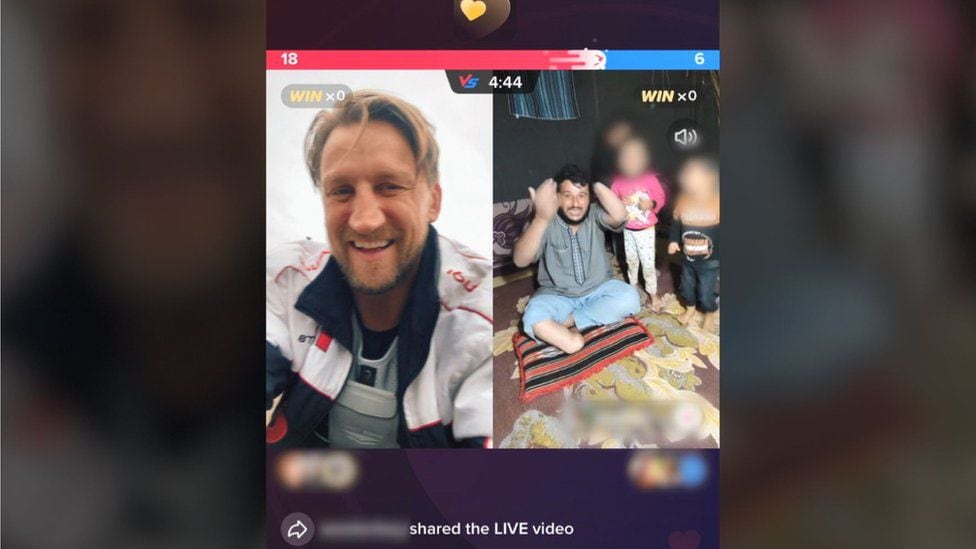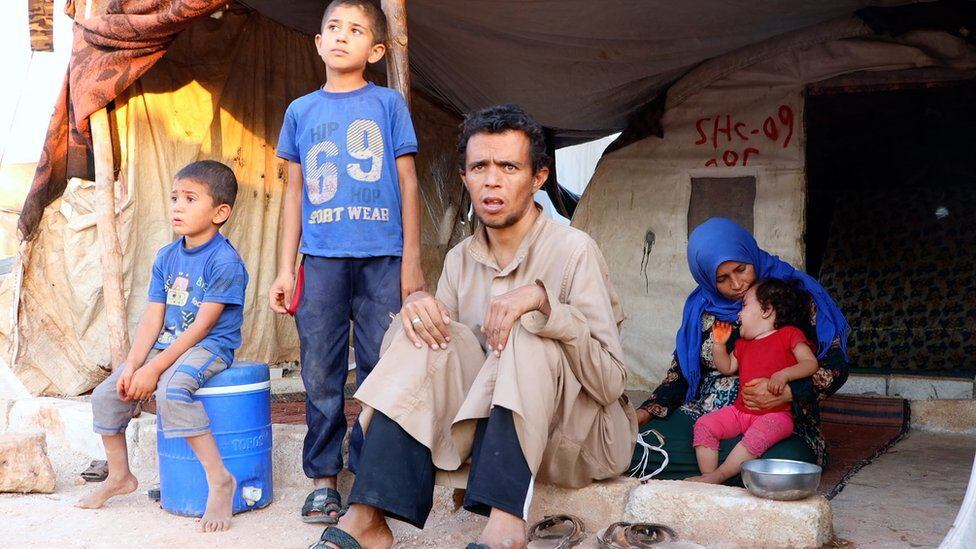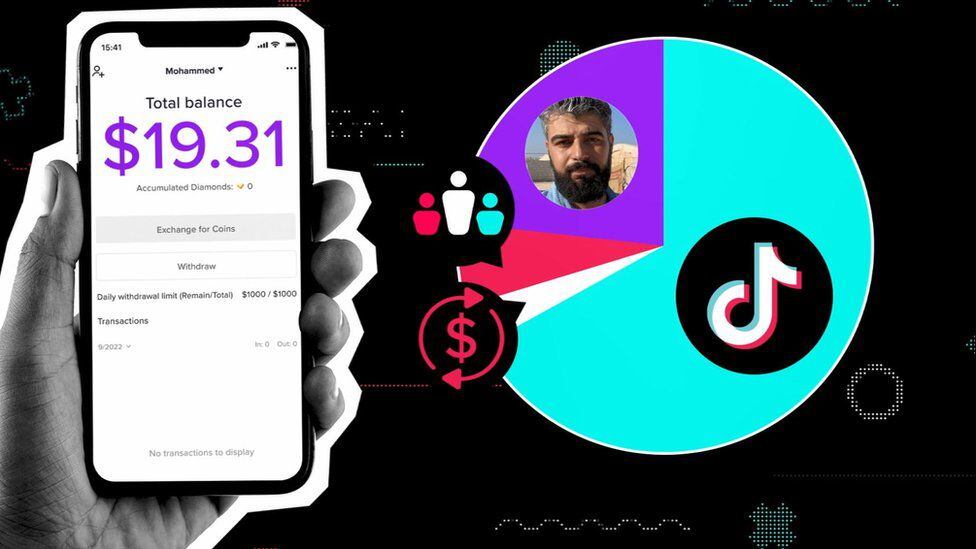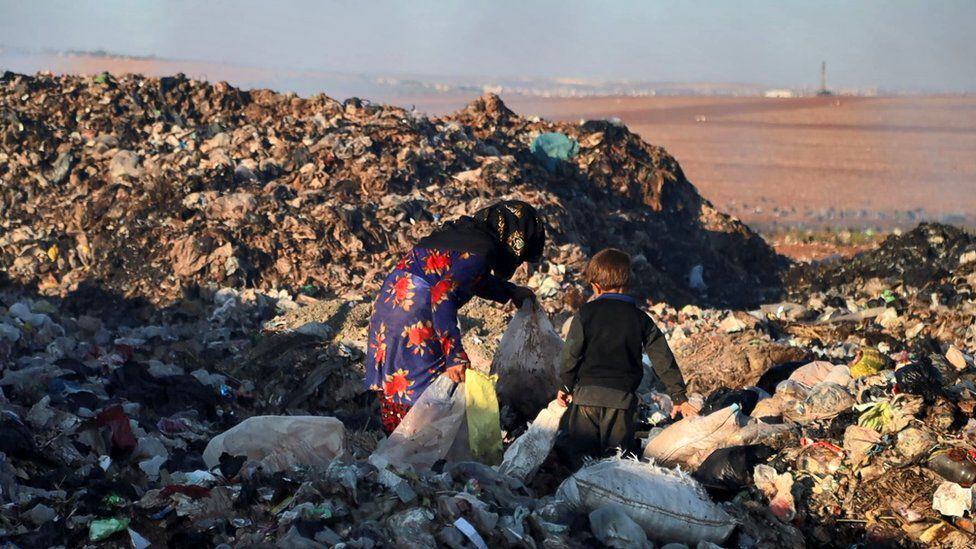A BBC News investigation found that the social media giant TikTok is receiving up to 70% of donations made through its app to hundreds of displaced families living in refugee camps in Syria.
Every day, Mona Ali al Karim and her six daughters go live on TikTok, begging viewers to give them virtual gifts.
The family sits on the floor of their tent for hours, repeating the few English phrases they know: “Please like, please share, please give away.”
LOOK: Content creators on TikTok will be able to link their accounts in other apps to promote themselves
Mona’s husband was killed in an airstrike. Since jobs are scarce in the camps, she has been using TikTok live streams to raise money for an operation for her daughter Sharifa, who is blind.
The gifts they ask for are virtual, but they cost real money and can be withdrawn from the app as cash.
Viewers of live streams can send animated gifts to reward or “tip” creators for content. They range from digital roses, which cost pennies, to lions or virtual universes, which cost around $500.
SEE ALSO: TikTok adds Instagram option: now you can post photos in the app
As the gifts appear on the screen, Mona’s youngest daughter jumps for joy. “Thank you,” she yells, “I love you!”
Mona’s family is one of hundreds begging on the platform. Earlier this year, similar videos began appearing in the feeds of TikTok users around the world. While some think it’s a scam, others have been more understanding.
LOOK: Russia imposes $50,000 fine on TikTok for failing to remove ‘LGBT propaganda’
TikTok influencer and former professional rugby player Keith Mason donated $330 in TikTok gifts to a family and encouraged his nearly one million followers to do the same.
“The kids seemed so happy, and even though the man had his legs and arm blown off, he was the most positive guy you could meet,” Keith said.
SEE ALSO: TikTok: so you can open your history of videos seen and retrieve the ones you liked the most
Behind the camera
However, there was something wrong. How is it that so many people who had lost their homes in the Syrian civil war they suddenly had phones, internet and TikTok accounts to broadcast live every day?

Syrian journalist Mohammed Abdullah told us that he recognized one of the camps in the videos, located near Idlib in northwestern Syria.
We asked him to come visit him. When he arrived, he immediately found several families like Mona’s begging on TikTok Live.
LOOK: Why is TikTok the preferred social network of Peruvian centennials?
He also met Hamid. Known in the camps as a “TikTok middleman”Hamid told him that he sold his cattle to pay for a mobile phone, a SIM card and a Wi-Fi connection, and started working with families on TikTok.

Now he broadcasts with 12 different families, for several hours a day.
“We go to TikTok Live and receive gifts. Every 100 roses gives me $1,” he explained.
SEE ALSO: TikTok removed 113 million videos for content violation
Hamid says he uses TikTok to help families make a living. He told us that he pays them most of the profits, minus the running costs.
Our team followed over 300 live accounts from camps in Syria. We discovered that many earned more than $1,000 an hour in gifts, but families in the camps say they receive a small fraction of the money donated to them.

Dowkan Hamdan Al-Khodr wanted to raise money for his daughter’s heart operation. After eight days of asking for gifts on TikTok Lives, she was only given $14.
So where does the money go?
LOOK: TikTok would be fined US$29 million for failing to protect minors’ data
The slice of TikTok
In June, we wrote to TikTok to ask how much they receive from donated gifts on their app. They didn’t tell us.
To find out, we live streamed from a TikTok account we set up in Syria. We sent $106 worth of TikTok gifts from another account in London. We were the only ones to give.

After the live stream ended, our Syrian test account balance was $33. TikTok had taken 69% of the value of the gifts.
After the experiment, we went to withdraw our $33 at a local money transfer shop. He took 10% more for his services. TikTok intermediaries like Hamid would have kept 35% of the rest.
SEE ALSO: TikTok removes weight-loss drug posts targeting kids
This would have left our ‘family’ with only $19 of the $106 donated. Many families told us that they are paid much less.
Agencies
Hamid and other brokers provide the equipment, but need help setting up accounts to get up and running on TikTok. We discovered that they are being supported by “live agencies” in Chinawhich work directly with TikTok.
“They help us if we have any problems with the app. They unblock the blocked accounts. We give them the name of the page, the profile picture and they open the account,” Hamid explained.
LOOK: TikTok would offer special treatment in reviewing the content of certain users, according to Forbes
These agencies, also known in China as “live streaming guilds,” are a growing part of TikTok’s global business strategy to bring live streamers to the platform.
Are hired by TikTok to help content creators produce more engaging live streams.
This encourages more people to use the platform longer, which attracts more advertising and giveaways, which then increases TikTok’s earnings.
SEE ALSO: Disinformation on TikTok worries researchers: what does the app say about it?
The agencies we spoke with say that TikTok pays them a commission based on the length of live streams and the value of gifts received.
“Child exploitation”
The emphasis on length means that kids will be broadcasting live for several hours at a time.
Marwa Fatafta of the digital rights organization Access Now says these videos are contrary to TikTok’s own policies to “prevent harm, endangerment or exploitation” of minors on the platform.
LOOK: BeReal: how is the social network against which TikTok wants to compete with TikTok Now?
“TikTok clearly states that users cannot explicitly request gifts, so this is a clear violation of its own terms of service, as well as the rights of these people”, he points out.
She acknowledges that people have a right to share their stories online “to try to seek support and compassion”, but says these videos “they lack dignity and are humiliating.”
SEE ALSO: Instagram Reels can’t beat TikTok: the Chinese platform exceeds them 10 times in numbers
“Exploitation of begging”

To test how rigorously TikTok enforces its child protection policies, we used the app’s built-in feature to report over 30 accounts with children begging. At the time, TikTok said “there was no breach” in either account.
When the BBC contacted TikTok directly, banned all accounts. The company was not interviewed, but said in a statement:
“We are deeply concerned about the information and allegations brought to our attention by the BBC, and have taken swift and rigorous action. This type of content is not allowed on our platformand we are further strengthening our global policies on the exploitation of begging.”
LOOK: Hackers claim to have data on 2 billion TikTok users, but platform denies breach
We asked TikTok how much they take from donated gifts. They insisted they take less than 70%, but refused to say how much. We repeated our experiment with accounts in the UK and Syria that were not registered with agencies, and found that TikTok took around 66% each time.
TikTok is the fastest growing social media app in the world, with over 3.9 billion downloads. He has earned more than $6.2 billion through the expenses that are made within the application.
Support for families
We reached out to various charities working in Syria to ensure that the families we spoke to were supported as an alternative to making money on TikTok Live.
SEE ALSO: Are you going to edit videos? Follow these keys to choose a good editing program
A local non-profit organization called Takaful Alsham said that will provide basic supplies for families for the next three months. The children will receive help finding schools and their school expenses will be covered.
But for many in the camps, there are few options other than asking for money online. Hundreds of families continue to livestream every day, and most of the money donated still goes to TikTok.
Additional Research and Reporting: Runako Celina, Cyrus Chan, Ned Davies, and Katy Ling.
Source: Elcomercio
I have worked as a journalist for over 10 years and have written for various news outlets. I currently work as an author at 24 News Recorder, mostly covering entertainment news. I have a keen interest in the industry and enjoy writing about the latest news and gossip. I am also a member of the National Association of Journalists.

:quality(75)/cloudfront-us-east-1.images.arcpublishing.com/elcomercio/GE4DANBNGEYC2MJUKQYDAORRHA.jpg)

:quality(75)/cloudfront-us-east-1.images.arcpublishing.com/elcomercio/W5MEIYZXQZDMXPYNEFH5LJ44GY.jpg)
:quality(75)/cloudfront-us-east-1.images.arcpublishing.com/elcomercio/HYWCDBJYGZA5FMS5YRVHIUKTMQ.jpg)
:quality(75)/cloudfront-us-east-1.images.arcpublishing.com/elcomercio/TPZUQ4MMOZCJ5HXVGVWZTW3F44.jpg)
:quality(75)/cloudfront-us-east-1.images.arcpublishing.com/elcomercio/AW5RKYENLZGYZPPN6Z6SUC2A4Q.png)
